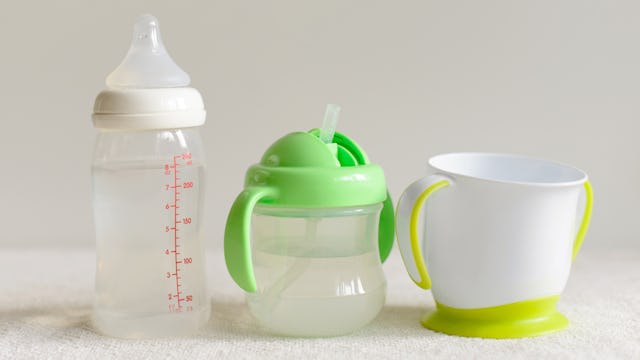AAP Says Don't Use The Dishwasher For Plastic Bottles And Sippy Cups

The chemicals found in certain plastics can be harmful to kids when heated
A new report issued by the American Academy of Pediatrics (AAP) includes information parents will find pretty alarming — specifically because it makes strong claims against microwaving and dishwashing certain plastic containers.
The findings, published in the August edition of PediatricsExperts, determined that “chemicals found in food colorings, preservatives, and packaging materials may harm children’s health,” and calls for stricter regulations around food safety.
The report listed the dangers of substances like bisphenols, phthalates, and styrene (indirect additives often found in foods’ processing and packaging) and cautioned that they can be extremely dangerous to infants and children and should be avoided.
But the most shocking part of the AAP’s findings has to do with heating plastics in the microwave or dishwasher. Because heat can cause plastics to leak BPA into our food, the AAP suggests not microwaving food or drink (including infant formula and breast milk) in plastic and to avoid putting plastics in the dishwasher altogether. And yes, there can still be dangerous chemicals in BPA-free plastics that can leach into food or milk when heated.
Obviously for parents who use sippy cups or bottles, you know not only how many you have coming in and out of the kitchen on a daily basis but how much more time it would take to hand wash each one individually. But the potential harmful effects of these substances are very real: Brain, development, obesity, autism, attention-deficit/hyperactivity disorder, and limited muscle mass and bone strength have all been associated with these additives according to the AAP’s findings.
Since the FDA doesn’t have the authority to retest packaging on already approved market items, they have additional guidelines to help protect against these dangers, including buying more fresh or frozen fruits and vegetables, fewer processed meats, and using glass and stainless steel instead of plastic as much as possible.
Leonardo Trasande, the study’s lead author said, “There are critical weaknesses in the current food additives regulatory process, which doesn’t do enough to ensure all chemicals added to foods are safe enough to be part of a family’s diet. As pediatricians, we’re especially concerned about significant gaps in data about the health effects of many of these chemicals on infants and children.”
The U.S. Food and Drug Administration is reviewing the paper’s findings, press officer Megan McSeveney told USA TODAY. She also said there is “reasonable scientific certainty” that additives “generally recognized as safe” are not harmful when used as directed. “If new information indicates substances are unsafe, the FDA has the authority to change previous guidelines or require that use of a substance is reduced or prohibited.”
In the meantime, parents might want to brush up on those hand-washing skills.
This article was originally published on